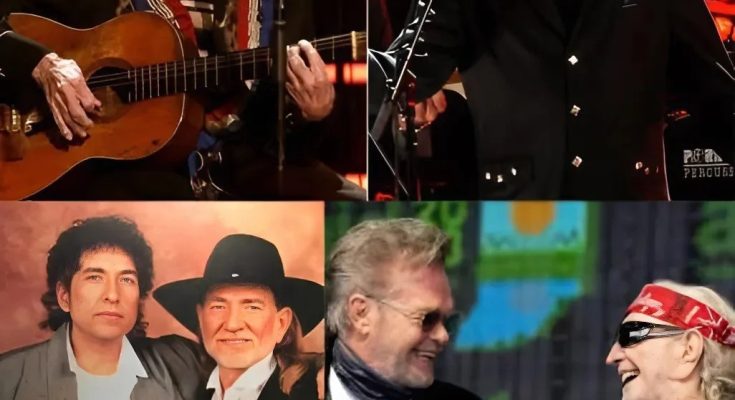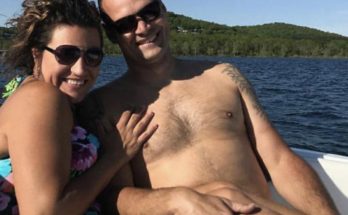“Two Legends, One Stage: Dylan and Nelson Rewrite the Rules of Classic Americana”
In a rare and unforgettable night beneath the stars at the historic Hollywood Bowl, two of music’s most revered troubadours—Bob Dylan and Willie Nelson—proved that legacy isn’t stuck in the past, it’s alive, breathing, and evolving in real time. As the Outlaw Music Festival rolled into Los Angeles for its second consecutive year, it delivered not just nostalgia, but reinvention and timeless artistry worthy of the momentous setting.
Dylan stepped into dusk like a shadow out of American folklore, his piano tucked stage-left amid a sea of black-clad bandmates, their presence more evocative of a gothic horseback procession than a standard concert ensemble. Opening with a sly and swaggering “Things Have Changed,” the 83-year-old bard set a tone both familiar and curiously offbeat. The backdrop—a calming image of a lake framed by mountains—was an understated nod to the natural serenity of folk music, while a crowd of rhinestones and Stetsons reminded all that country swagger is far from forgotten in the City of Angels.
While the tour’s opening acts—a vibrant pairing of bluegrass virtuosos Sierra Hull and Billy Strings—warmed up the crowd with flair, it was Dylan’s set that offered the biggest sense of enigma. Abandoning the expected, this current tour tears away from his recent Rough and Rowdy Ways material in favor of subtle deep cuts, rolling reinterpretations, and unexpected cover songs. Tracks like “Simple Twist of Fate” and “Desolation Row” were barely recognizable in their honky-tonk makeovers—Dylan’s piano often stepping ahead with a rhythm that was part jazz club, part saloon. Gone was the nasal whisper of his youth; what remains is a voice that cuts like gravel and poetry.
“To Ramona” danced with a refreshing shuffle, while “All Along the Watchtower” took on such a smooth, jazzy groove it might have entered lounge territory—a surprising stylistic nod that bordered on cinematic. Then came “Blind Willie McTell,” carrying the fingerprints of Dire Straits, and even the oft-overlooked “Under the Red Sky” shone with rare depth and openness.
Dylan’s selections extended into previously unperformed covers, pulling from the blues-drenched “Axe and the Wind” and mellow country crooners like Charlie Rich’s “I’ll Make It All Up to You.” Ever the stage mystery, Dylan barely addressed the audience, offering no introductions or anecdotes—only turning to crack a dry joke regarding someone’s snack in the crowd. At one point, even the Bowl’s large screens stayed off in what felt like a deliberate choice: in this performance, hearing carried far more weight than seeing.
Still, the crowd came alive every time Dylan picked up his harmonica, especially during his show-closing rendition of “Don’t Think Twice, It’s All Right,” which drew thunderous applause. Redressed in jangly piano and gleaming harmonica, the song became an anthem of resilience in retrospection.
Where Dylan was enigmatic and distant, Willie Nelson was all warmth and glowing twilight. At 92, the elder statesman of outlaw country seated himself beside Trigger—his legendary guitar—surrounded by his literal family both on stage and in spirit. Opening with “Whiskey River,” Nelson was met with roaring affection, reaffirming his place as Americana’s quiet sage, smiling through every chorus as though singing beside a crackling campfire.
His set was a greatest hits parade stitched together by personal stories and tributes to friends long gone. Nelson dipped into classics like “Good Hearted Woman” (a nod to Waylon Jennings), “Workin’ Man Blues” (for Merle Haggard), and “Help Me Make It Through the Night” (in honor of Kris Kristofferson). Each song was delivered not just as performance, but as shared memory.
A particularly spirited rendition of “Bloody Mary Morning” brought the crowd to their feet, especially when its Los Angeles reference hit home. Later in the evening, masses joined in a singalong of “Mammas Don’t Let Your Babies Grow Up to Be Cowboys,” their collective voices filling the Bowl in a moment of true musical communion.
Adding a layer of humor and heart, Nelson performed two songs penned by his son Micah (a.k.a. Particle Kid): the witty “Everything is Bullshit” and the philosophical “Halfway to Heaven.” Never before has a song about the absurdities of life felt so endearing—especially with Willie chuckling his way through the refrain, as if laughing at life itself.
The closing moments brought out the festival family for a communal finale, with everyone except Dylan returning for a spirited, full-stage singalong of “Will the Circle Be Unbroken?” and “I’ll Fly Away.” The harmonies soared gently into the cool night, a fitting and emotional conclusion to a night that celebrated not just music, but the endurance of American songwriting at its finest.
As the lights dimmed and the echo of Hank Williams’s “I Saw the Light” played him off, Willie Nelson—smiling, waving, and still very much in control—exited the stage like a man content with the road behind him and grateful for each stage left ahead.

